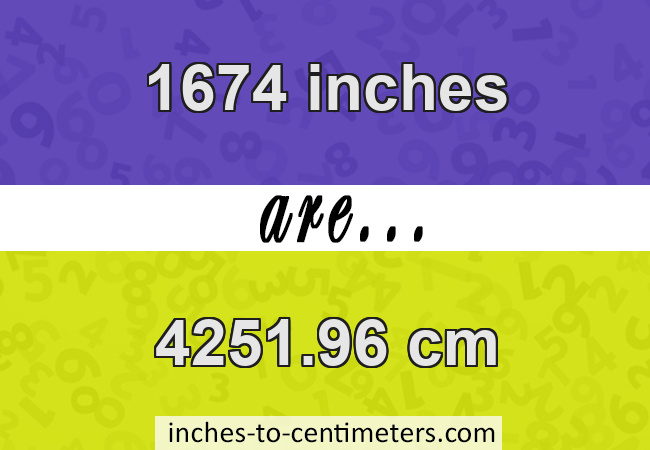To convert 1674 inches to cm, multiply the length in inches by 2.54
Formula:
1674 in x 2.54 cm = 4251.96 cm
How long is 1674 inches?
To convert inches to centimeters, you can use the following conversion:
1 inch = 2.54 cm
One inch equals 2.54 centimeters, so 1674 inches will equal 4251.96 cm.
If we have a measurement given in inches and want to convert it to centimeters, we can multiply that measurement in inches by 2.54.
This relationship is used to convert length measurements between imperial units and metric units.
To convert a measurement in inches to centimeters, first convert the feet to inches using the formula above. Then, add the number of inches to the result to get the total number of inches. Finally, multiply the total number of inches by 2.54 to convert the measurement to centimeters.
How many cm is 1674″?
There are 2.54 centimeters in one inch, so 1674 inches is equal to 1674″ x 2.54cm = 4251.96 centimeters
Conversion from One Thousand Six Hundred Seventy Four Inch to Centimeters
The conversion factor from inches to centimeters is 2.54. Knowing this, all you need is a calculator to convert to 1674 inches. Or better yet: you calculate in your head. No matter how you do the conversion, the result should be as follows:
1674″ equals 4251.96 centimeters
1674 Inches to CM Conversion Table
| IN | CM | Conversion |
|---|---|---|
| 1673.5 | 4250.69 | 1673.5 inches to cm |
| 1673.6 | 4250.944 | 1673.6 inches to cm |
| 1673.7 | 4251.198 | 1673.7 inches to cm |
| 1673.8 | 4251.452 | 1673.8 inches to cm |
| 1673.9 | 4251.706 | 1673.9 inches to cm |
| 1674 | 4251.96 | 1674 inches to cm |
| 1674.1 | 4252.214 | 1674.1 inches to cm |
| 1674.2 | 4252.468 | 1674.2 inches to cm |
| 1674.3 | 4252.722 | 1674.3 inches to cm |
| 1674.4 | 4252.976 | 1674.4 inches to cm |
| 1674.5 | 4253.23 | 1674.5 inches to cm |
Conversions near 1674 inches
This conversion table provides the conversions between inches (in) and meters (cm) for quick and easy reference.
| IN | CM | Conversion |
|---|---|---|
| 1664 | 4226.56 | 1664 in to cm |
| 1665 | 4229.1 | 1665 in to cm |
| 1666 | 4231.64 | 1666 in to cm |
| 1667 | 4234.18 | 1667 in to cm |
| 1668 | 4236.72 | 1668 in to cm |
| 1669 | 4239.26 | 1669 in to cm |
| 1670 | 4241.8 | 1670 in to cm |
| 1671 | 4244.34 | 1671 in to cm |
| 1672 | 4246.88 | 1672 in to cm |
| 1673 | 4249.42 | 1673 in to cm |
| 1674 | 4251.96 | 1674 in to cm |
| 1675 | 4254.5 | 1675 in to cm |
| 1676 | 4257.04 | 1676 in to cm |
| 1677 | 4259.58 | 1677 in to cm |
| 1678 | 4262.12 | 1678 in to cm |
| 1679 | 4264.66 | 1679 in to cm |
| 1680 | 4267.2 | 1680 in to cm |
| 1681 | 4269.74 | 1681 in to cm |
| 1682 | 4272.28 | 1682 in to cm |
| 1683 | 4274.82 | 1683 in to cm |
| 1684 | 4277.36 | 1684 in to cm |
Definition of Inch
The inch, signified by ” or “in,” is a unit of measurement in the Anglo-American System of Measurement, which is used in the US, Canada, and other parts of the Caribbean. This unit is also seen in other countries for technical products, such as the size of screens and screws. Its basis is the width of a thumb or finger.
Definition of Centimeter
The Metric System establishes the meter as the fundamental unit of length, and the Centimeter is derived from it. The abbreviation for the Centimeter is “cm”. It is equal to 0.01 meters, or 10 millimeters, and is used internationally as a unit of measurement.
Other questions solved about 1674 inches
- What is the result of converting 1674 inches to centimeters using the conversion chart?
- How do I apply the conversion factor for inches to centimeters to calculate the equivalent measurement in centimeters for 1674 inches?
- What is the result of using the conversion factor to convert 1674 inches to centimeters?
- What is the result of using the conversion chart to find the equivalent measurement in centimeters for 1674 inches?
- Can you provide an example of how to use the formula for converting inches to centimeters with 1674 inches as the starting value?
- What is the equivalent length in centimeters of 1674 inches according to the conversion factor?
- How many centimeters are equivalent to 1674 inches according to the conversion factor?

